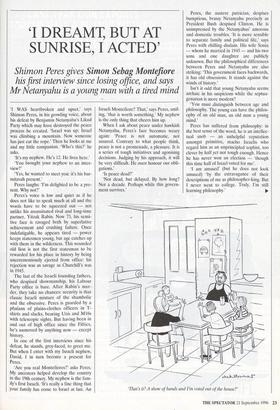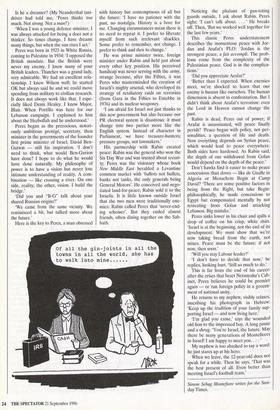DREAMT, BUT AT SUNRISE, I ACTED'
Shimon Peres gives Simon Sebag Montefiore his first interview since losing office, and says Mr Netanyahu is a young man with a tired mind
'I WAS heartbroken and upset,' says Shimon Peres, in his growling voice, about his defeat by Benjamin Netanyahu's Likud Party which may have destroyed the peace process he created. 'Israel was up; Israel was climbing a mountain. Now someone has just cut the rope.' Then he looks at me and my little companion. 'Who's this?' he asks.
'It's my nephew. He's 12. He lives here.' 'You brought your nephew to an inter- view?'
'Yes, he wanted to meet you: it's his bar- mitzvah present.'
Peres laughs: 'I'm delighted to be a pre- sent. Why not?'
Peres's voice is low and quiet as if he does not like to speak much at all and the words have to be squeezed out — not unlike his assassinated rival and long-time partner, Yitzak Rabin. Now 73, his sensi- tive face is ravaged both by superlative achievement and crushing failure. Once indefatigable, he appears tired — power keeps statesmen young, but age catches up with them in the wilderness. This wounded old lion is not the first statesman to be rewarded for his place in history by being unceremoniously ejected from office: his rejection was as savage as Churchill's was in 1945.
The last of the Israeli founding fathers, who despised showmanship, his Labour Party office is bare. After Rabin's mur- der, they take no chances: security is that classic Israeli mixture of the shambolic and the obsessive. Peres is guarded by a phalanx of plains-clothes officers in T- shirts and slacks, bearing Uzis and M16s with telescopic sights. But having been in and out of high office since the Fifties, he's unmoved by anything now — except history.
In one of the first interviews since his defeat, he stands, grey-faced, to greet me. But when I enter with my Israeli nephew, David, I in turn become a present for Peres, 'Are you real Montefiores?' asks Peres. My ancestors helped develop the country in the 19th century. My nephew is the fam- ily's first Israeli. 'It's really a fine thing that your family has come to Israel at last. An Israeli Montefiore? That,' says Peres, smil- ing, 'that is worth something.' My nephew is the only thing that cheers him up.
When I ask about peace under hawkish Netanyahu, Peres's face becomes weary again: 'Peace is not automatic, not assured. Contrary to what people think, peace is not a promenade, a pleasure. It is a series of tough initiatives and agonising decisions. Judging by his approach, it will be very difficult. He must honour our obli- gations.'
'Is peace dead?'
'Not dead, but delayed. By how long? Not a decade. Perhaps while this govern- ment survives.'
Peres, the austere patrician, despises bumptious, brassy Netanyahu precisely as President Bush despised Clinton. He is unimpressed by the Netanyahus' amorous and domestic troubles. 'It is more sensible to separate family and political life,'. says Peres with chilling disdain. His wife Sonia — whom he married in 1945 — and his two sons and one daughter are publicly unknown. But the philosophical differences between Peres and Netanyahu are also striking: 'This government faces backwards, it has old obsessions. It stands against the winds of history.'
Isn't it odd that young Netanyahu seems archaic in his suspicions while the septua- genarian is more modern?
'You must distinguish between age and philosophy. The young can have the philos- ophy of an old man, an old man a young mind.'
Peres has suffered from philosophy: in the best sense of the word, he is an intellec- tual snob — an unhelpful reputation amongst primitive, macho Israelis who regard him as an unprincipled sophist, too clever by half yet not tough enough. Hence he has never won an election — 'though this time half of Israel voted for me'.
'I am amused' (but he does not look amused) 'by the extravagance of their descriptions of me as philosopher-king. But I never went to college. Truly, I'm still
learning philosophy.' 1111.
'That's it? A show of hands and I'm voted out of the house?' Is he a dreamer? (My Neanderthal taxi- driver had told me, 'Peres thinks too much. Not strong. Not a man!') When I was a young defence minister, I was always attacked for being a doer not a thinker. So times change. I have dreamt many things, but when the sun rises I act.'
Peres was born in 1923 in White Russia, coming to Palestine m 1934: 'I opposed the British mandate. But the British were never my enemy. I knew many of your British leaders. Thatcher was a grand lady, very admirable. We had an excellent rela- tionship. I knew Wilson well; he started OK but always said he and we could move spending from military to civilian research. It does not always work like that. I espe- cially liked Denis Healey. I know Major, Blair. When Portillo was here for our Lebanon campaign, I explained to him about the Hezbollah and he understood.'
Peres began as the precocious, notori- ously ambitious protégé, secretary, then minister in the governments of the founder first prime minister of Israel, David Ben- Gurion — still his inspiration. 'I don't need to think, what would Ben-Gurion have done? I hope to do what he would have done naturally. My philosophy of power is to have a vision but never lose intimate understanding of reality. A com- bination — like crossing a river. On one side, reality; the other, vision. I build the bridge.'
'Did you and "B-G" talk about your shared Russian origins?'
'We came from the same vicinity. We reminisced a bit, but talked more about the future.'
Here is the key to Peres, a man obsessed with history but contemptuous of all but the future: 'I have no patience with the past, no nostalgia. History is a bore for me. Changing circumstances mean there is no need to repeat it. I prefer to liberate myself from such irrelevant shackles. Some prefer to remember, not change. I prefer to think and then to change.'
He was prime minister twice, foreign minister under Rabin and held just about every other key position. His perceived handicap was never serving with the army, strange because, after the Fifties, it was Peres who masterminded the creation of Israeli's mighty arsenal, who developed its strategy of retaliatory raids on terrorists (from Gaza in the Fifties to Entebbe in 1976) and its nuclear weaponry.
'I am afraid for Israel not just thanks to this new government but also because our PR electoral system is disastrous: it must change into two parties more like the English system. Instead of character in Parliament, we have treasure-hunters; pressure groups, not lawmakers.'
His partnership with Rabin created peace: Rabin was the general who won the Six Day War and was trusted about securi- ty; Peres was the visionary whose book New Middle East heralded a Levantine common market with 'ballots not bullets, banks not tanks, the only generals being General Motors'. He conceived and nego- tiated land-for-peace; Rabin sold it to the Israelis. It is little known outside Israel that the two men were traditionally ene- mies: Rabin called Peres that 'never-end- ing schemer'. But they ended almost friends, often dining together on the Sab- bath. Noticing the phalanx of gun-toting guards outside, I ask about Rabin. Peres sighs: 'I can't talk about. . ' He breaks off. Then, 'But we worked well together for the last few years.'
This classic Peres understatement describes the momentous peace with Jor- dan and Arafat's PLO: 'Jordan is the strongest peace, a fait accompli. The prob- lems come from the complexity of the Palestinian peace. God is in the complica- tions.'
'Did you appreciate Arafat?'
'Better than I expected. When enemies meet, we're shocked to learn that our enemy is human like ourselves. The human dimension is absent in confrontation. But I didn't think about Arafat's terrorism: even the Lord in Heaven cannot change the past.
Rabin is dead, Peres out of power; if Arafat is assassinated, will peace finally perish? 'Peace began with policy, not per- sonalities, a question of life and death. Now everything depends on Syrian peace, which would lead to peace everywhere. Both sides have hardened. As Rabin said, the depth of our withdrawal from Golan would depend on the depth of the peace.'
Don't hawks find it easier to make peace concessions than doves — like de Gaulle in Algeria or Menachem Begin at Camp David? 'There are some positive factors in being from the Right, but take Begin: philosophically, he made concessions to Egypt but compensated mentally by not retreating from Golan and attacking Lebanon. Big mistake.'
Peres sinks lower in his chair and spills a drop of coffee on his crisp, white shirt. 'Israel is at the beginning, not the end of its development. We must show that we're now taking bread from the earth, not mines. Peace must be the future: if not now, then soon.'
'Will you stay Labour leader?'
'I don't have to decide that now,' he replies, looking hurt. 'Still so much to do.'
This is far from the end of his career: after the crises that beset Netanyahu's Cab- inet, Peres believes he could be premier again — or run foreign policy in a govern- ment of national unity.
He returns to my nephew, visibly relaxes, inscribing his photograph in Hebrew: 'Keep up the tradition of your family sup- porting Israel — and now living here.' 'I'm glad you came,' says the wounded old lion to the impressed boy. A long pause and a shrug. 'You're Israel, the future. May there be many generations of Montefiores in Israel! I am happy to meet you.... My nephew is too abashed to say a word: he just stares up at his hero. When we leave, the 12-year-old does not speak for a while. Then he says, 'That was the best present of all. Even better than meeting Israel's football team.'
Simon Sebag Monteflore writes for the Sun- day Times.



















































































 Previous page
Previous page